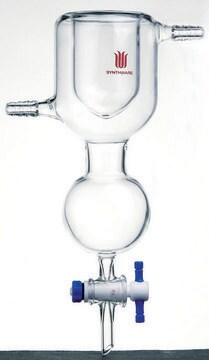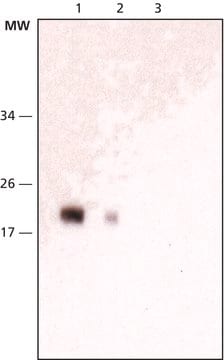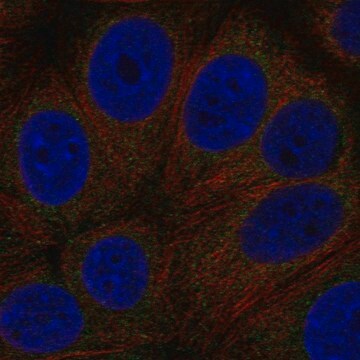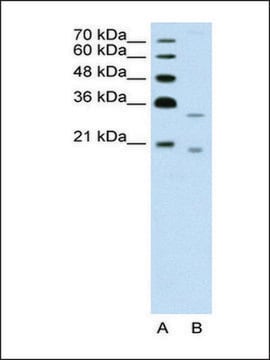WH0004103M1
Monoclonal Anti-MAGEA4 antibody produced in mouse
clone 3D12, purified immunoglobulin, buffered aqueous solution
Synonim(y):
Anti-MAGE4, Anti-MAGE41, Anti-MAGE4A, Anti-MAGE4B, Anti-MAGEX2, Anti-MGC21336, Anti-melanoma antigen family A, 4
About This Item
Polecane produkty
pochodzenie biologiczne
mouse
białko sprzężone
unconjugated
forma przeciwciała
purified immunoglobulin
rodzaj przeciwciała
primary antibodies
klon
3D12, monoclonal
Postać
buffered aqueous solution
reaktywność gatunkowa
mouse
metody
indirect ELISA: suitable
indirect immunofluorescence: suitable
western blot: 1-5 μg/mL
izotyp
IgG2bκ
numer dostępu GenBank
Warunki transportu
dry ice
temp. przechowywania
−20°C
docelowa modyfikacja potranslacyjna
unmodified
informacje o genach
human ... MAGEA4(4103)
Opis ogólny
Immunogen
Sequence
TSPDAESLFREALSNKVDELAHFLLRKYRAKELVTKAEMLERVIKNYKRCFPVIFGKASESLKMIFGIDVKEVD
Działania biochem./fizjol.
Postać fizyczna
Informacje prawne
Oświadczenie o zrzeczeniu się odpowiedzialności
Not finding the right product?
Try our Narzędzie selektora produktów.
Kod klasy składowania
10 - Combustible liquids
Temperatura zapłonu (°F)
Not applicable
Temperatura zapłonu (°C)
Not applicable
Środki ochrony indywidualnej
Eyeshields, Gloves, multi-purpose combination respirator cartridge (US)
Certyfikaty analizy (CoA)
Poszukaj Certyfikaty analizy (CoA), wpisując numer partii/serii produktów. Numery serii i partii można znaleźć na etykiecie produktu po słowach „seria” lub „partia”.
Masz już ten produkt?
Dokumenty związane z niedawno zakupionymi produktami zostały zamieszczone w Bibliotece dokumentów.
Nasz zespół naukowców ma doświadczenie we wszystkich obszarach badań, w tym w naukach przyrodniczych, materiałoznawstwie, syntezie chemicznej, chromatografii, analityce i wielu innych dziedzinach.
Skontaktuj się z zespołem ds. pomocy technicznej





